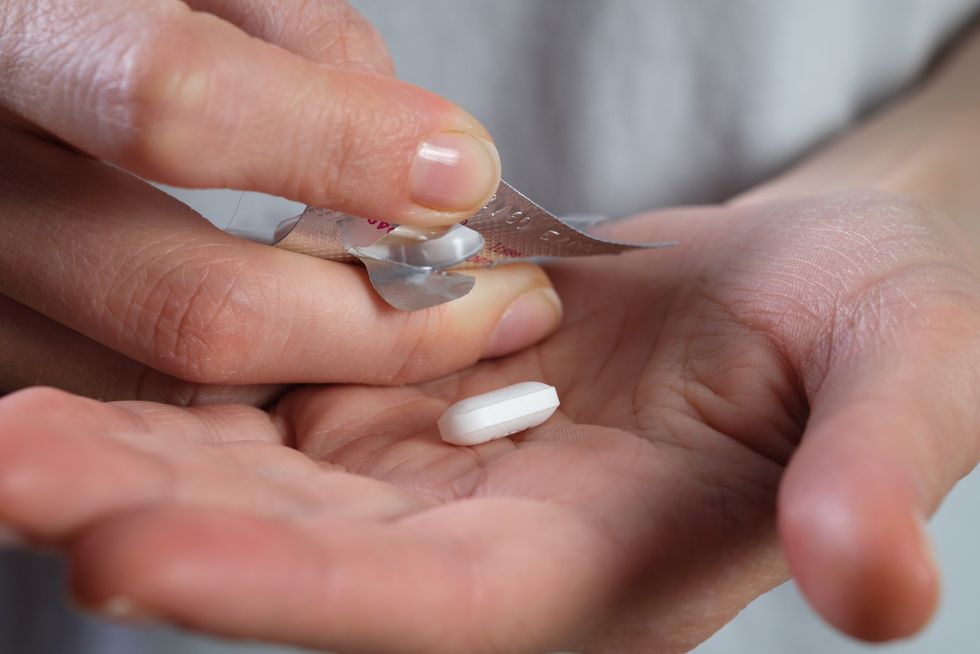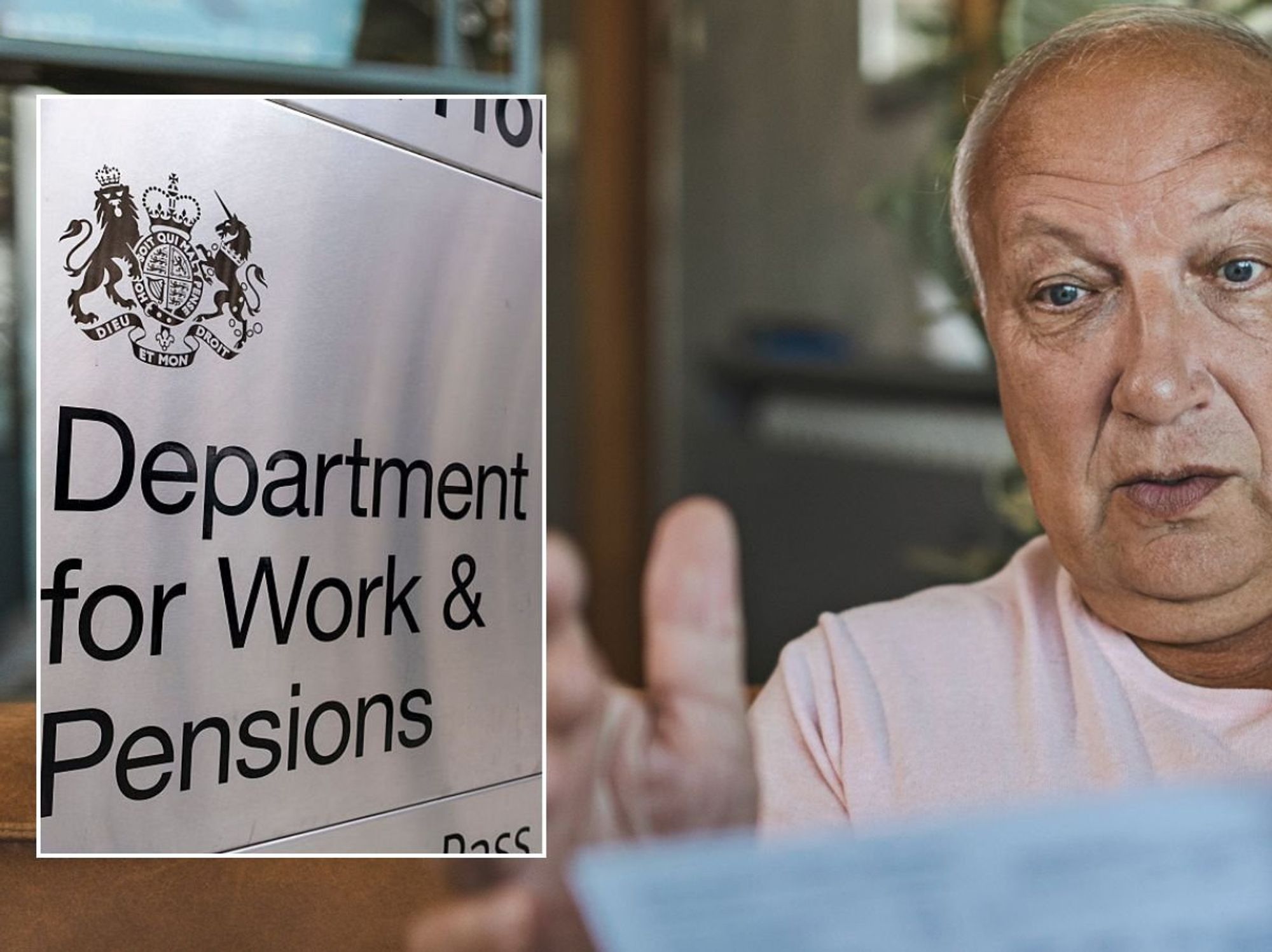GBN Investigation: A health scandal rocked the NHS during the Covid pandemic - and you probably know nothing about it

B12 injections were withdrawn during the pandemic and this had catastrophic consequences
|Getty Images

Patients are fighting tooth and nail. Our digital health editor reports from the frontline
Don't Miss
Most Read
Latest
In a health investigation by our Health Editor Adam Chapman, we look at a scandal that occurred during the Covid pandemic which has been overlooked ever since.
Speaking to patients from across the UK, we pull together their stories and expose the truth of a Government failing to act.
During the Covid pandemic, patients severely deficient in B12 suddenly stopped receiving their B12 injections - and they are still living with the consequences, GB News can exclusively reveal.
Vitamin B12 supports everything from the production of red blood cells to nerve function and DNA synthesis.
Despite being essential for life, we cannot produce B12 for ourselves.
That's why we must top it up through our diet - meat and dairy products are particularly rich in B12.
Seems easy enough, right? Think again. The leading cause of B12 deficiency in the UK is not related to diet.
Pernicious anaemia (PA) is an autoimmune condition which prevents the absorption of B12 in the gut due to a depletion in the main protein involved in B12 absorption.
As a workaround, people with PA or other stomach issues are usually treated with B12 tablets or injections.
B12 injections are absorbed much better by the body because they are administered intramuscularly (into the muscle), and therefore directly into the blood.
B12 tablets must pass through the digestive system, which leads to much poorer absorption rates.
It speaks to how important the former is that the NHS recommends those who need it get an injection of hydroxocobalamin every two to three months for the "rest of your life".
However, the taps were suddenly turned off during the pandemic and this had catastrophic effects, an investigation by GB News reveals.
Many patients told us that the decision to suspend their injections and switch to oral B12 tablets during the pandemic ruined their lives.
For some, it was symptomatic of a wider issue: the lack of national and international consensus on how to define B12 deficiency.
This was best summed up in a BMJ editorial last year, which noted that diagnosing B12 deficiency can be "challenging" because no "single specific measurement exists to reliably diagnose or refute the presence of B12 deficiency".
In the absence of a “gold-standard” test to define B12 deficiency, many cases are slipping through the net. It also leads to perverse treatment outcomes.
Data from a review of patient experiences and surveys involving more than 2200 patients with B12 deficiency in the UK indicate that many patients have concerns related to healthcare quality, safety, and treatment, with nearly two-thirds of respondents reporting that their treatment is insufficient to manage symptoms.
For the BMJ authors, the clinical picture is the most important factor in determining whether someone has B12 deficiency.
You might be wondering at this point why all this matters.

The decision was a result of restricted access to healthcare facilities and supply chain bottlenecks during Covid
|Getty Images
Although it is not well defined, B12 deficiency has an estimated prevalence of around six percent in people under the age of 60 and closer to 20 percent in people aged over 60.
This means millions of people are living with a condition that can cause everything from crippling fatigue to irreversible damage to the brain and nervous system if left untreated.
Many patients found themselves on the sharp end of this after the UK Government enacted lockdown measures in response to the Covid pandemic in 2020.
Unable to physically see their GP, NHS clinics up and down the country moved their patients off B12 injections to daily oral cyanocobalamin (B12 tablets) on the advice of the British Society of Haematology (GB News is yet to get a response after repeated attempts to contact the BSH).
A quick scroll on the internet turns up several NHS clinics that announced this move at the time (GB News has also reached out to them for comment).
Given we were in the midst of a medical emergency, the move was understandable.
As Doctor Linda Koshiba explains, "During the pandemic, it was crucial to reduce trips to healthcare facilities to lower the risk of COVID-19 exposure".
The founder of Natural Endocrinology Specialists tells GB News that switching to oral B12 tablets allowed people to maintain their vitamin levels from the "comfort and safety" of their homes.
It was also driven by supply chain bottlenecks, which made it harder to get certain medical supplies, including injectable B12, she says.
With tablets easier to produce and distribute, they naturally became a more practical option.
- Cost Savings: Oral B12 tablets are generally more affordable than injections, which involve not just the cost of the medication but also the cost of visiting a clinic for administration.
- Convenience: Taking a tablet at home is far easier and less intimidating for most people than getting a shot.
In Doctor Koshiba's expert opinion, the alternative on offer - high-dose oral B12 (typically 1000-2000 mcg daily) - can be quite effective for many people.
There are sublingual tablets that dissolve under the tongue, helping the vitamin to be absorbed directly into the bloodstream, she notes.
The doctor cites studies showing that oral B12 supplements can maintain adequate levels just as effectively as injections, especially if taken in high doses.
One systematic review and network meta-analysis of thirteen studies, published in Springer, evaluated three administration routes of vitamin B12: oral, intramuscular, and sublingual routes.
The researchers concluded that all three routes effectively increase the level of vitamin B12 without significant differences between them. However, the intramuscular injection)route was the "top-ranked statistically" but without clinical significance.
In a strict "risk-reduction scenario", the switch to tablets made sense at the time, Doctor Sean Ormond of Atlas Pain Specialists tells your correspondent.
As a pain management doctor, he witnessed firsthand the switch from B12 injections to tablets during the height of the pandemic.
However, the doctor adds, the move was "not ideal" for high-risk patients, acknowledging that injections are generally preferred for those with pernicious anaemia or severe B12 deficiency due to "guaranteed" absorption.
In response to a request for comment, a spokesperson for NICE shared with GB News the recently revised guidelines, which cover managing B12 deficiency and care, including recommendations around tablets and injections.
However, scores of patients feel these new guidelines are not being properly implemented and are still fighting to get hold of their injections.
This has driven many of them to source B12 injections from overseas and self-administer without their GP’s knowledge or guidance, research shows.
Unguided self-medication carries many potential risks such as incorrect self-diagnosis, dangerous drug interactions, incorrect manner of administration, severe adverse reactions, and masking of severe disease.
LATEST DEVELOPMENTS
Infectious disease that kills one in 10 found in UK
UK heatwave: The 30-minute symptom that's deadly
Doctor Q&A: Something keeping you up at night?

Patients in their droves are sourcing B12 injections from overseas and self-administering
|Getty Images
These problems predate the pandemic but they became more acute in 2020.
At the time of the switch, a subset of patients expressed concerns about the long-term impact that it would have on their condition management, and in an online survey many stated that they were dissatisfied with the level of care received.
The UK-wide survey, which ran between June 26, 2020, and October 5, 2020, fielded 683 responses; of these, 329 participants indicated that they had experienced a change to their prescribed treatment as a consequence of the pandemic.
A few concerning trends emerged. A total of 276 respondents said the decisions to change treatment were mostly initiated by a healthcare professional with no further discussion with the patient.
A small number of individuals requested that they be provided an alternative treatment and nearly half of respondents stated that they were unsure how long the change to their treatment would last.
In most cases, treatment changes meant patients’ injections had been suspended and replaced with B12 tablets and nutritional advice provided.
One participant wrote: "I was told last week due to Covid that I can’t have it [injections]. Now after phoning today, I’m told one doctor is looking at everyone who receives a B12 injection is being referred to one doctor for blood tests to see if we still need it."
Similarly, another wrote: "I had to fight with GP to continue [injections], at present awaiting blood results to see if injection [sic] will be stopped or continues."
Some participants even said they were not offered an alternative, while others reported experiencing increased fatigue, a fuzzy brain, forgetfulness and more as a result of the change from injections to tablets.
More than 200 respondents reported feeling "let down, undervalued" and "left to become ill regardless of the consequences for me or my family" as a result of the decision.
One of the leading voices in this space is Jimmy Norman. Through his fight, he has started a campaign to raise awareness and challenge current practices.
The self-proclaimed "accidental" leader of a movement is self-effacing to a fault, but it became clear after trawling through hours of research and interviews that Jimmy is a hero to many who feel silenced.
Jimmy is currently pursuing legal action against his GP practice over its refusal to prescribe him B12 injections during the pandemic.
His deficiency was judged to be on the "borderline" so doctors put him on tablets instead.
The tablets initially seemed to be working. Then his symptoms "hit him like a tonne of bricks", he tells GB News.

Patients expressed concerns about the long-term impact switching to tablets would have in a UK-wide survey.
|Getty Images
He was given 50 microgram tablets to take twice a day for two months.
The doctor told him to come back if his condition didn't improve - and it didn't. It got much worse.
Jimmy made allowances for his symptoms at first, chalking them up to the physical demands of his job.
But the tiredness soon became impossible to ignore: "There would be days when I would get eight hours sleep and feel like I'd never slept at all."
Then other symptoms started to "creep in", he tells GB News. Jimmy developed neurological symptoms. He would get dizzy, and light-headed. His legs would ache just walking and he would get mouth ulcers "one after another".
"At my worst, I remember feeling like my body was shutting down and giving up. I believed that I was going to die."
With his health rapidly deteriorating, Jimmy researched the NICE guidelines and went back to his GP. He was told he could not have injections until a specialist could be consulted, despite that being the course of treatment the guidelines recommended.
After not hearing back from the doctors, Jimmy followed up and was told he was supposed to have been referred to neurology. At this point, he was offered to increase his dosage of tablets.
Once again, Jimmy asked about receiving his treatment as an injection as opposed to a tablet like the rest of his family members with the same deficiency had. He was finally told it was a possibility, however, his treatment would be limited due to already having taken the tablets.
After deciding to try the injections, Jimmy slowly started to see some improvement, but after the last injection, there was a rapid decline in his health. He returned to the doctors once again, asking for more injections and was again, told no.
Jimmy wrote a letter of complaint and quoted NICE, BNF (British National Formulary) and the NHS website and pled his case to receive proper care. He was told he could not have more injections as they were at risk of being criticised by specialists and even if they could give him the injections, there were not enough appointment times available to administer them.
A spokesperson for the NHS told GB News that they would not comment on individual cases but "if there’s severe clinical evidence that supports the notion of patient harm, there are alternatives, and as such, if patients do have notable issues, they could receive the injection", adding that NICE can speak directly to the "efficacy of treatments".
While Jimmy talked to a "brick wall", his symptoms went from bad to worse. He had to take four months off work with sick leave. His condition continues to deteriorate as he fights to get the frequency of his injections increased.
Many patients can relate to Jimmy's plight.
Tip of the iceberg
It was identified that Katie had unexplained B12 deficiency in 2020. She was getting plenty of the vitamin in her diet.
Her GP at the time put her on tablets.
"He said that during Covid he’d been conducting his own research and noticed patients were fine on tablets and didn’t need injections. I believed him," she told GB News.
She took the tablets from 2020 until 2023 but they didn't have the intended effect. On the contrary, her condition deteriorated and she eventually became "bedbound".
Katie, who is in her 30s, had extreme fatigue, heart palpitations, chest pain and brain fog.
"My GP was baffled and wondered if I had chronic fatigue syndrome or long Covid," she said.
This went on for months. Then, through her research, she came across a doctor at the Cambridge Iron Clinic.
He diagnosed her with PA (she has coeliac disease so it was clear to him why she wouldn’t absorb B12 orally) and a severe iron deficiency.
He started Katie on B12 injections, which she now orders from Germany and she had an iron infusion.
It wasn’t instant but with consistency and every other day self-injecting Katie is now able to work full time in a demanding role.
"I’ve been able to function and do normal day-to-day activities. Without B12 [injections], I honestly don’t know what quality of life I would have."
Medina was on the "verge of losing her job" and couldn't "function at all" when she was put on tablets, which she says "didn't do much".
She eventually gave up on the "GP route" and bought her own injections.
"It was like a whole new world had opened up," she told GB News.
The switch to injections restored Medina's quality of life.
"That feeling is almost impossible to describe. When you've been so ill for so long and you suddenly realise that it doesn't have to be like that," she told GB News.
Your correspondent has seen a copy of a letter from one woman's GP practice insisting that her deficiency is dietary so she was refused injections.
A copy of a separate letter from Carol's private consultant sent to her GP in March, however, advises giving her two injections a week, alongside folic acid and vitamin D, with a review in June following blood tests.
"Since starting to inject myself twice a week my life has improved dramatically, I can now walk around the supermarket without feeling on the brink of collapse, I'm using the exercise bike several times a week and many of my symptoms have improved and not just by a small amount," she told GB News.
Others are still very much in the trenches. After Ray had her B12 injections withdrawn in response to Covid, she turned to getting vitamin B12 injections at a local beauty parlour.
The 65-year-old's condition has since improved immeasurably but the beauticians will only give her an injection every three months so her quality of life is still greatly undermined.
Elaine pleaded with her GP to increase the dosage of her injections, citing the NICE guidelines which recommend every other day injections, but he refused.
At this point, she was not prepared to let her health deteriorate any further so resorted to ordering B12 from abroad and started self-injecting at home.
"However, I did not give up on my battle for the GP to treat me properly, their next excuse was they did not have the nursing resources," she told GB News.
Despite this it was still a "constant battle" to get the B12 from the in-house pharmacy every month, she says.
Elaine fumes at what she claims is a " staggering ignorance" and "lack of knowledge" about treating B12.
"I felt like a drug addict begging for a fix because that was how they treated me."
Hope is on the horizon
The updated NICE guidelines recommend that GPs consider the possibility of vitamin B12 deficiency in patients exhibiting one symptom or one risk factor.
It emphasises the importance of recognising a wide range of symptoms and signs that could indicate a deficiency - including cognitive difficulties, such as:- Eyesight problems
- Mental health issues
- Neurological/mobility problems
- Unexplained fatigue
The guidelines highlight the necessity for an initial diagnostic test for suspected vitamin B12 deficiency, utilising either total B12 or active B12 tests, (unless specific circumstances require an alternative approach).
They stress the significance of not ruling out a diagnosis based solely on the absence of certain indicators like anaemia or macrocytosis.
- Age
- Dietary restrictions
- Family history
- Certain health conditions
- Medication use
- Previous surgeries
By casting the net wider, it is also hoped that the guidelines will expand the criteria of eligibility for injections.
Shortly before she left office in May, Jane Hunt, the former Conservative MP for Loughborough, presented her Medicines (Vitamin B12 Injections) Bill which would allow vitamin B12 injections to be sold, supplied or administered by a registered pharmacist without a prescription.
That would bring the UK’s “approach in line with that of other countries, affording those with B12 deficiency the same dignity and control over their health as a diabetic using insulin, and reducing the workload and financial burden on GP practices", she said in her speech to parliament. A Change.org petition on that very subject recently garnered more than 100,000 signatures, reflecting the groundswell of support for the motion.
The move to self-inject, driven by the pandemic, has an "upside", claims Medina: it could ease the pressure on staffing shortages, as well as being more practical and convenient for patients.
In her estimation, it "has the potential to save millions of pounds for the NHS".
Survey data supports her claims. Patients who had been enabled to self-treat over the pandemic embraced the change to their treatment and preferred this to standard treatment.
Individuals who decided to self-treat were often able to administer injections at a treatment schedule that was more based on individual need, the survey data suggests.
The industry is also giving out signals that it is amenable to change. Guy's and St Thomas' NHS Foundation Trust has released guidance on self-administering B12, for example.
All this augurs a brighter future but a long and uncertain road still lies ahead for those caught in the grip of B12 deficiency.
"What happens if the government stops us importing supplies of B12 from Europe?" Wonders Carol.
It is clear from speaking to patients and surveying the current landscape that a sea change in diagnosing and treating B12 needs to happen - and it needs to happen now.
The switch to tablets during the pandemic was a "necessary adaption" but it was "not without drawbacks", acknowledges Doctor Ormond of Atlas Pain.
In his opinion, it has highlighted the importance of individualised care and close monitoring for B12 replacement therapy.
Moving forward, the best approach depends on the individual patient, the doctor says.
Ideally, a doctor should:
- Evaluate Individual Needs: Assess the severity of B12 deficiency, digestive health, and overall health status before suggesting tablets.
- Monitor Blood Levels: Regular blood tests are crucial to ensure B12 levels stay within the desired range, especially with tablets.
- Consider Re-Evaluation: As the pandemic situation improves, re-evaluate if injections are a better option for long-term management.










